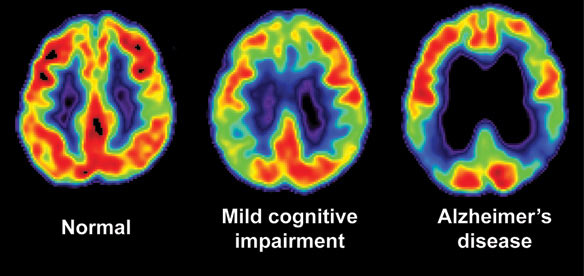Over the last ten years, it has become clear that Parkinson's Disease encompasses far more than just problems with movement. Dementia is common in the late stages of the disease, but recent work shows that even in the early stages, patients often start to have subtle difficulties with mental processes such as reasoning, planning and memory. This is known as mild cognitive impairment and is also seen before Alzheimer's disease. Usually these problems are not severe enough to cause problems in daily living and their significance is not yet fully understood. However, if some of these subtle changes could be picked up early and if they predict progression to dementia - which has a huge impact on quality of life and care needs - there may be opportunities to intervene in this process and keep patients in better health for longer.
To get a better understanding of how mild cognitive impairment is involved in the early stages of Parkinson's Disease are currently working to include cognitive testing alongside the tests of movement currently used in the PREDICT-PD cohort, and hope to see some early results from this process next year.
This review by Alison Yarnall is an excellent overview of where we currently are in understanding mild cognitive impairment in Parkinson's Disease.
-Anna Nagy
__________
http://ageing.oxfordjournals.org/content/early/2013/07/17/ageing.aft085
Brain imaging showing progression of mild cognitive impairment to Alzheimers disease
To get a better understanding of how mild cognitive impairment is involved in the early stages of Parkinson's Disease are currently working to include cognitive testing alongside the tests of movement currently used in the PREDICT-PD cohort, and hope to see some early results from this process next year.
This review by Alison Yarnall is an excellent overview of where we currently are in understanding mild cognitive impairment in Parkinson's Disease.
-Anna Nagy
__________
http://ageing.oxfordjournals.org/content/early/2013/07/17/ageing.aft085
Age Ageing. 2013 Sep;42(5):567-76. doi: 10.1093/ageing/aft085. Epub 2013 Jul 17.
Mild cognitive impairment in Parkinson's disease.
Yarnall AJ, Rochester L, Burn DJ.
Institute for Ageing and Health, Newcastle University, Campus for Ageing and
Vitality, Newcastle upon Tyne, Tyne and Wear NE4 5PL, UK.
The concept of mild cognitive impairment (MCI) in the general population has
received increased attention over recent years, and is associated with risk of
progression to Alzheimer's disease. Within Parkinson's disease (PD), MCI (PD-MCI)
is also now recognised to be relatively common, with certain subtypes predicting
progression to Parkinson's disease dementia (PDD). Recently, criteria to better
characterise PD-MCI and its subtypes have been produced by the Movement Disorder
Society. In contrast to the population as a whole, where amnestic MCI is the most
common subtype, non-amnestic PD-MCI dominates, with prominent executive and
attention dysfunction. Although the pathophysiology of PD-MCI is poorly
understood and encompasses both PD and non-PD pathology, it is most likely the
result of a complex interaction between neurotransmitter dysfunction, synaptic
pathology, protein aggregation and neuronal damage. Determining the factors that
influence the progression of these pathologies in PD and the individuals at risk
of ultimately developing PDD is critical for targeted intervention and drug
discovery studies. Further work is required, however, to determine the
significance of PD-MCI and also to validate the diagnostic criteria. This would
be best delivered in the form of longitudinal studies in homogenous cohorts of PD
participants, to allow prognostication and generalisation among the PD
population. At the present time, no drug therapies are available for PD-MCI.
Management includes screening for the disorder, excluding treatable causes of
cognitive decline and cautious use of dopamine agonists and medications such as
anticholinergics.
PMID: 23868092 [PubMed - in process]
Mild cognitive impairment in Parkinson's disease.
Yarnall AJ, Rochester L, Burn DJ.
Institute for Ageing and Health, Newcastle University, Campus for Ageing and
Vitality, Newcastle upon Tyne, Tyne and Wear NE4 5PL, UK.
The concept of mild cognitive impairment (MCI) in the general population has
received increased attention over recent years, and is associated with risk of
progression to Alzheimer's disease. Within Parkinson's disease (PD), MCI (PD-MCI)
is also now recognised to be relatively common, with certain subtypes predicting
progression to Parkinson's disease dementia (PDD). Recently, criteria to better
characterise PD-MCI and its subtypes have been produced by the Movement Disorder
Society. In contrast to the population as a whole, where amnestic MCI is the most
common subtype, non-amnestic PD-MCI dominates, with prominent executive and
attention dysfunction. Although the pathophysiology of PD-MCI is poorly
understood and encompasses both PD and non-PD pathology, it is most likely the
result of a complex interaction between neurotransmitter dysfunction, synaptic
pathology, protein aggregation and neuronal damage. Determining the factors that
influence the progression of these pathologies in PD and the individuals at risk
of ultimately developing PDD is critical for targeted intervention and drug
discovery studies. Further work is required, however, to determine the
significance of PD-MCI and also to validate the diagnostic criteria. This would
be best delivered in the form of longitudinal studies in homogenous cohorts of PD
participants, to allow prognostication and generalisation among the PD
population. At the present time, no drug therapies are available for PD-MCI.
Management includes screening for the disorder, excluding treatable causes of
cognitive decline and cautious use of dopamine agonists and medications such as
anticholinergics.
PMID: 23868092 [PubMed - in process]

No comments:
Post a Comment